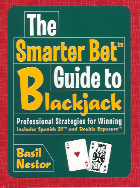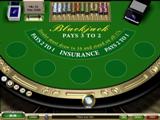ReadyBetGo's Guide to Blackjack Basic Strategy
Favorable and Unfavorable Blackjack GamesBlackjack Rule Variations and Their CostsVariations of Blackjack Basic StrategyBlackjack Single-Deck Strategy ChartLearning Blackjack Basic StrategyGuessing at BlackjackBlackjack Side Bets and Bonuses
Before You Go! - Blackjack Strategy Essentials
Smarter Bet Guide to Blackjack
by Basil Nestor
Strategy is the key to success at the blackjack table; that's a mathematical fact, and you can count on these expert, easy-to-learn tactics to make you a victor. Here's the deal: everything begins with the basic rules, and they're laid out on these pages with smart little “factoid” tips. Go through blackjack economics, which explain why cards fall the way they do, and what makes a good (and a sucker) bet. Easy-to-follow tables suggest strategies for splitting pairs and soft hands and provide dozens of other statistics and card probabilities.
Online Blackjack Site Offers Surrender!
The surrender rule is a good deal for the blackjack player, but is hard to find at brick and mortar casinos nowadays. Casino Tropez offers this favorable rule at their online casino which cuts the house edge to a low 0.39%. If you're looking to play longer and win more, be sure to try the blackjack surrender table!
Blackjack Side Bets and Bonuses
by Basil Nestor
Side bets and bonuses are designed to jazz up traditional blackjack and increase the casino’s profit on the contest. A side bet is an extra wager that conveniently soaks up dollars won on the Basil Nestor is the author of the new Playboy Complete Guide to Casino Gambling. This wonderful book teaches players how to avoid sucker bets and win more when playing gambling games. He is also the author of The Smarter Bet Guide series for video poker, slots, craps, and many other books about gambling. Basil's website is www.smarterbet.com basic low-edge game. In contrast, bonuses are free, but they act as enticements to a higher-edge game. Remember, a casino is like any business. Nothing is really free, the money has to come from somewhere.
Basil Nestor is the author of the new Playboy Complete Guide to Casino Gambling. This wonderful book teaches players how to avoid sucker bets and win more when playing gambling games. He is also the author of The Smarter Bet Guide series for video poker, slots, craps, and many other books about gambling. Basil's website is www.smarterbet.com basic low-edge game. In contrast, bonuses are free, but they act as enticements to a higher-edge game. Remember, a casino is like any business. Nothing is really free, the money has to come from somewhere.
 Basil Nestor is the author of the new Playboy Complete Guide to Casino Gambling. This wonderful book teaches players how to avoid sucker bets and win more when playing gambling games. He is also the author of The Smarter Bet Guide series for video poker, slots, craps, and many other books about gambling. Basil's website is www.smarterbet.com basic low-edge game. In contrast, bonuses are free, but they act as enticements to a higher-edge game. Remember, a casino is like any business. Nothing is really free, the money has to come from somewhere.
Basil Nestor is the author of the new Playboy Complete Guide to Casino Gambling. This wonderful book teaches players how to avoid sucker bets and win more when playing gambling games. He is also the author of The Smarter Bet Guide series for video poker, slots, craps, and many other books about gambling. Basil's website is www.smarterbet.com basic low-edge game. In contrast, bonuses are free, but they act as enticements to a higher-edge game. Remember, a casino is like any business. Nothing is really free, the money has to come from somewhere. Your goal is to make sure the money is coming from someone else’s pocket.
Casino side bets almost always have a negative expectation. Conversely, all double-down bets (when properly executed) have a positive expectation, so it’s always a better idea to save your money and double down rather than wager on a blackjack side bet.
Sideshow Side Bets
A good general rule to follow is that side bets are nearly always bad bets. Save your money for doubling and splitting. But if you’re still curious, here are some typical propositions on the side.
Royal Match: Will your first two cards be suited? Some casinos allow you to bet on this possibility. Two suited cards typically pay 5:2 and a royal match, king and queen of the same suit, pays 25:1. The actual probability of drawing a suited match is about 24 percent or slightly less than 1 in 4. The chance of smacking a royal match is about 0.3 percent or about 1 in 335 hands (depending on the number of decks in the game). That works out to a house edge of around 7 percent. Ouch! Did someone say royal?
By the way, if you ever see this bet paying 6:2 (3:1) instead of 5:2 for a regular match, and the game is played with four or more decks, then it’s a positive expectation wager. Someone in casino management will have made a mistake (it’s been known to happen), and you’ll want to capitalize on these odds before they’re changed.
Super 7s: What’s the chance that your first card will be a 7? How about two sevens in two cards, or maybe three sevens if you take a hit? Some casinos will pay you 5,000:1 for three suited sevens in a multiple-deck game. Unfortunately the odds of drawing the big one are closer to one in 60,000. Even with extra payoffs for one and two sevens, the overall edge for this bet is typically about 12 percent.
Red/Black: This bet pays 1:1 when you guess the color of the next dealer’s upcard. Deuces of the color you choose are a push, so there are 26 ways to lose and only 25 ways to win. The house edge is about 2 percent.
Over/Under: Will your next two cards be over 13 or under 13? Did I mention that 13 was a loser? The over bet has an edge of about 7 percent and under is more than 10 percent. Make this bet too often, and you’ll definitely go under.
Bonus Onus
Bonuses are enticements, off-beat favorable rules designed as promotions. One example is giving an automatic win to players with five cards in their hand, or paying more for hands with triple numbers. One particularly cute variation is the envy bonus. If one person at the table wins a big prize, everyone at the table gets something extra.
Bonuses cost you nothing unless you deviate from basic strategy to pursue them. While it’s technically correct in some situations to change basic strategy for a bonus, those changes don’t necessarily add much long-term value. You’re better off sticking with basic strategy unless you play a particular bonus game exclusively. Then you should learn a strategy that optimizes for the specific bonus (as in Spanish 21).
Want to know the optimal strategies for the blackjack variations Spanish 21, Double Exposure and 21st Century Blackjack? Check out Basil Nestor’s Smarter Bet Guide to Blackjack.
[ learn more blackjack! ]

